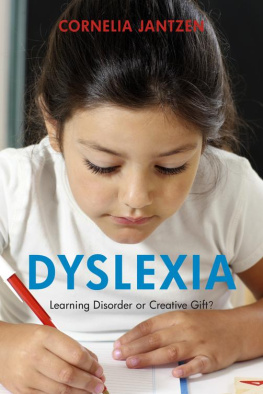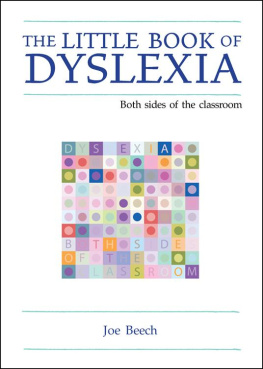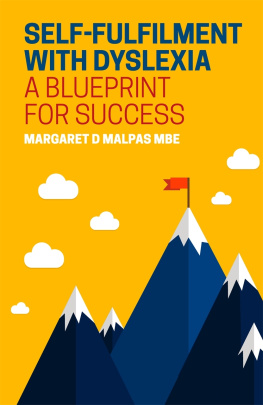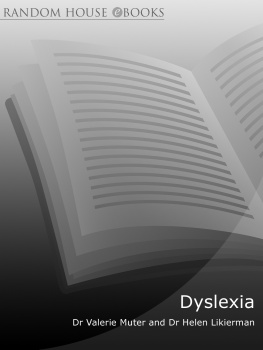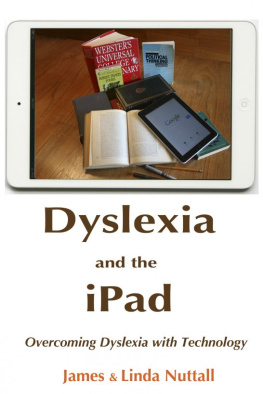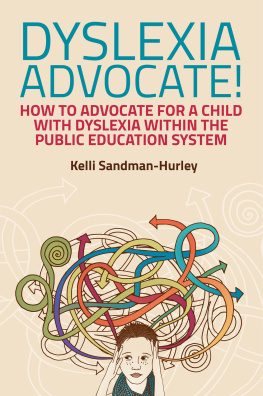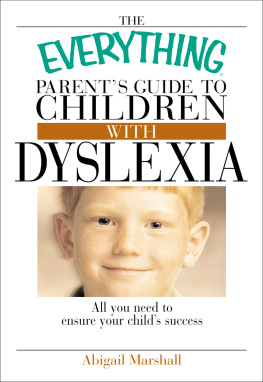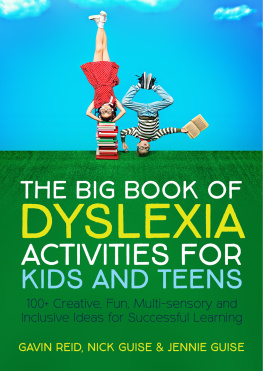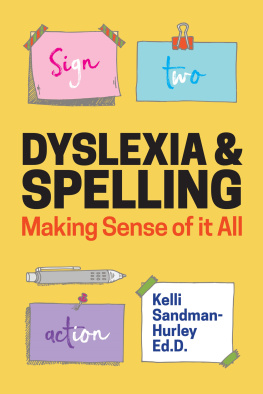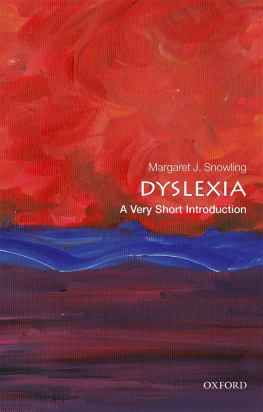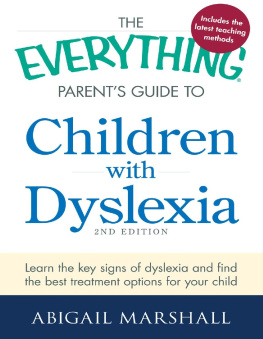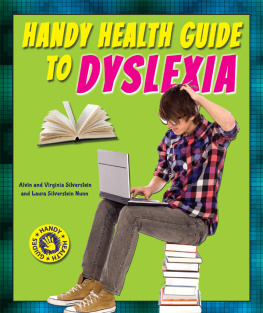I was constantly afraid that people might find out I wasnt a proper person, that I was handicapped.
There could scarcely be a clearer, more shocking indictment of the effects on a child of traditional verdicts about dyslexics: as people incapable of learning, low in intelligence and defective.
Cornelia Jantzens book gives a striking account of how she overcame this common, narrowly prejudiced view of dyslexia. Through daily observations, encounters and experiences, she involves us in a process that gives greater insight into the special mode of perception and thinking of dyslexic children.
In this project two people above all are exemplary for her: Ronald Davis, whose method teaches how the apparent hindrances suffered by dyslexic children can be overcome through their own underlying gifts; and Rudolf Steiner, whose ideas on education at the beginning of the twentieth century showed how every child can develop in an integrated and holistic way. Cornelia Jantzen details thoughts of Steiners that helped her to recognize and nurture the special gifts of dyslexic children.
The moving thing about this book is the authors deep regard for dyslexic children, her sympathy with their suffering, her courage in breaking away from fixed judgements and in seeking to understand a so often misinterpreted reality in order to offer help.
Drawing on the Davis method and Rudolf Steiners educational ideas, Cornelia Jantzen conveys above all a joy in discovery and a courage for meeting contemporary phenomena in the spirit of open-minded enquiry. May it inspire us for that is precisely what we need today.
So now its grown into a book
It started with Post-its full of notes, quickly recorded experiences with my own and other children, with many questions and next to no answers about the phenomenon of dyslexia. The subject was one which had interested me academically over twenty years before, but had faded from my view until, with vivid immediacy, it caught up with me again in duplicate, in the shape of my own children sitting there in front of me at the breakfast table.
Thus began an exciting time of discovery, rethinking and learning and also, to my great good fortune, of new acquaintances. Alongside many other people who enriched my life, I met Ronald Davis, who recurs a great deal in this book; and (though Im not sure that I can say this, yet for me personally its true) I got to know Rudolf Steiner, who died in 1925 but who lives on vitally today in his works, ideas, visions, in his view of the human being and his educational ideas.
Davis and Steiner were the two essential and revolutionary figures who I would never have encountered if the phenomenon of dyslexia had not seated itself unexpectedly at my breakfast table. Drawing on them and my own experience, recorded in that pile of Post-its, in 1997 I produced a photocopied and self-published brochure entitled How weve been maltreated which forms Part I of this book.
And in the spring of 2000, with two new parts added, it grew into a book, a proper book. But is it finished? Of course not! Im still miles away from thinking every thought to its final conclusion, solving every problem, answering every question. Youll need to know this before you go any further. However finished it may look, it makes absolutely no claim to completeness.
Please read and regard it in the same way that it gradually formed and developed over about two years: as a kind of puzzle to which still, almost daily, new pieces are added both from the literature on the subject, where I keep discovering new aspects and perspectives, and from daily life and practical experiences in my work with dyslexic children and adolescents. I have recorded a process of development here, and its goal still lies in the future. This is a stock-take, therefore, and not a final audit.
You will see that the book contains many detailed quotations, for I want to convey all the parts of the puzzle in as authentic a way as possible, and thus place the ideas of those quoted alongside each other as objectively as I can, as food for debate. At the same time I am aware that subjective colourings from my own way of thinking cannot be denied. For this reason I urge you to read the quotations and suggestions I cite in their original context particularly if they strike you as unbelievable.
My first, key part of the puzzle was to read the book by Ronald Davis: The Gift of Dyslexia: Why Some of the Brightest People Cant Read and How They Can Learn. I found it difficult to understand the change of paradigm from a disability to a talent or gift, or even to begin to accept it. That is why I understand the fact that this view of dyslexia and the resulting methods for overcoming it are still the subject of fierce debate.
This is also, after all, why I wrote this book. In daily life I repeatedly tested my many doubts and my lack of understanding, and continually found that the insights underlying the Davis approach were affirmed. At the same time, it should not be forgotten that implementing the Davis method in practice is not exactly straightforward; it is not easy to integrate mastering symbols by visualizing them into learning methods and schools. Children must maintain their motivation to use the Davis method, so we keep in touch with pupils and parents after the consultation week. In the appendix you will find further information about this, along with the report of a mothers experiences, interviews with dyslexic children and adolescents, and an interview with a certified Davis adviser.
I am not concerned here with methods of handling or even curing dyslexia, but rather with developing an understanding for the special modes of perception and thinking which underlie it, and are the basis of dyslexics special gifts. I want to work my way through to this understanding with you, at the same time showing the correlations between particular dyslexic gifts and Rudolf Steiners visionary approach to education. Here, I am convinced, lies the key to hitherto untapped possibilities for successful acquisition of literacy skills. The ideas and suggestions in my book are therefore intended for all:
- who are curious and willing to engage with new ideas and do not expect any sure-fire remedy;
- who are still wondering about the dyslexia phenomenon or other learning disabilities and have no easy answers;
- who harbour mild doubts about todays school learning, whether in mainstream schools or Waldorf schools;
- who are involved with primary-level literacy teaching;
- who have always considered Rudolf Steiners educational ideas to be innovative;
- who are fascinated by the huge diversity in human modes of perception;
- who are keen to attempt to learn more about the nature of genius;
- parents, teachers and therapists, who put great effort into helping children with learning disabilities;
- dyslexics, old and young, to whom I owe so much.
My unbounded sympathy goes out to all the above. I have written this book for them. And with them I want to carry on trying things out, thinking and investigating.
Cornelia Jantzen
Hamburg, March 2000
Someone who desired to understand everything about me
would find harmony where, since he does not understand me,
he sees only contradiction.
RUDOLF STEINER, IN A LETTER (1903)
Dyslexics are, ostensibly, people who have difficulty in learning, and later using, written language. Some remain more or less illiterate while others learn to cope with their disability.
There are countless publications on this phenomenon, a flood of efforts to explain the supposed causes, and even more suggestions for treating it. But they so far add up to the realization that learning to live with it is the only remedy possible for dyslexics. This may sound drastic, but most dyslexics can cope outstandingly well with the last residues of their dyslexia (bad spelling, slow or imprecise reading).

